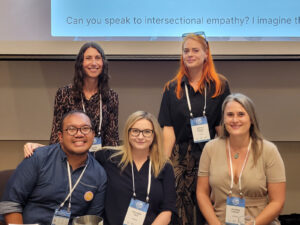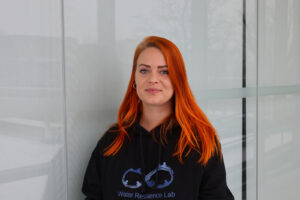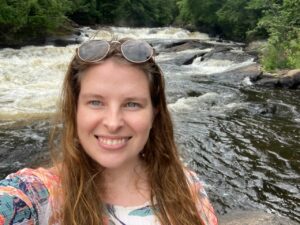Empathy for Sustainability
Written by Hannah Marlen Lübker and edited by Keziah Mayer Photo by Jen Holzer

This blog post is part of a series reflecting on a selection of sessions and keynotes that were presented at the PECS-III Conference, Montreal Canada, 12-15 August 2024
Judging by the amount of people in the seminar room – filling almost every chair and even sitting on the floor in the back – empathy is the new hot topic to watch out for.
As people trickle into the room, they are greeted by an anonymous poll which asks them to define what empathy means to them – a nod to the endless debates on the definition (and meaning) of empathy, but also an offer to reflect on how attendees use the term in their everyday lives. In the days leading up to the session, they might have noticed the posters displaying QR codes strategically placed around the conference venue, which lead to a questionnaire useful to test one’s empathy. This served both as a fun way to prepare for the session, and as an advertisement (pretty clever if you ask me…).
We tried to assemble a diverse group of speakers for this organized symposium, including different career stages (from first-year PhD student to associate professor), different home countries (the Philippines, Germany, the United States, and Canada), and most importantly: different viewpoints on empathy (Team Batson vs. Team Davis). We were also trained in quite different ‘disciplines’, ranging from cognitive psychology, to crop and soil science, to transdisciplinary sustainability science, which shape how we think about the topic of empathy and how we approach our research in general. This diversity is necessary, since we wanted to present different perspectives as we debated two broad questions: How can we measure and assess empathy? And how can we build empathy for sustainability?
The session is kicked off by Prof. Julia Baird, our team leader serving as moderator, gives an overview of what’s to come and hints at our upcoming paper: a meta-analysis of studies on building empathy. Dr. Gillian Dale, the only team member formally trained in psychology, describes the components and different sub-constructs of empathy (cognitive and affective empathy, dispositional and context-specific empathy), as well as several well-established and psychometrically-sound measurement tools. Dr. Lauren Lambert, whose PhD was focused on empathy in sustainability contexts of deliberation and collaboration across difference, explains her model which is composed of three interlinked aspects: social, ecological, and futures empathy. Elson Galang, PhD candidate, draws on his recent experience in participatory scenario planning with environmental decision-makers as an example of successful self-reporting of empathy by participants using Batson’s empathic concern index. Lastly, I, Hannah Marlen Lübker, offer a (very mild and friendly) critique of more traditional empathy measurements and outline how I hope to rethink empathy during my PhD by focusing on relationships rather than on individuals.
After a round of audience questions, we dive into the second part of the symposium, which is concerned with building empathy and furthering sustainability outcomes while doing so. We present the first results of our meta-analysis, which show that interventions combining role-playing with perspective taking are most effective in building empathy. Our suggestions are focused on both the research process (stressing the value of collaboration and participation) and the methods used (including arts-based methods and scenario planning). Yet, we also acknowledge that interventions aiming to build empathy in the individual may not be enough. Empathy is fostered through continuous practice, which may be effortful and time-consuming, and is further influenced by societal structures that can either inhibit or facilitate its expression. We end our talks by asking ourselves how we can imagine – and then enact – a system in which empathy is an emergent property.
We then turn to the audience – which conveniently consists of experts in various sustainability-related fields – and ask them how they could apply these ideas in their own work. While we made sure to include time for audience questions, we run out of time before we can answer the surprising amount of insightful and challenging questions we receive. If your question was not answered, please feel free to email anyone of us, we LOVE talking about this topic. Also, we have a lot of exciting work in the pipeline, so you might want to keep an eye out for that and follow our social media channels – trust me, this is just the beginning.
To keep up with our work, check out https://empathyforsustainability.com/!


